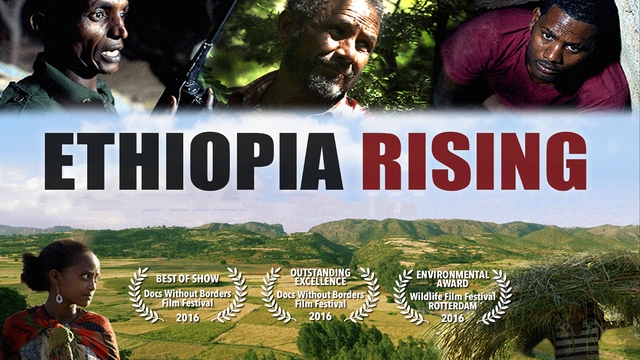Ethiopia Rising
The story of one man's mission to create an Eden out of Africa's barren landscape.
 The remarkable and inspiring story of how one man turned his barren environment, destroyed by war, into a lush and verdant Eden. For the last thirty years, Abu Hawi has fought tirelessly to protect the beautiful forests surrounding his village. Following the devastation of a long civil war he planted over a million trees, mobilised an entire community to regenerate their surroundings and saved his village from certain extinction.
The remarkable and inspiring story of how one man turned his barren environment, destroyed by war, into a lush and verdant Eden. For the last thirty years, Abu Hawi has fought tirelessly to protect the beautiful forests surrounding his village. Following the devastation of a long civil war he planted over a million trees, mobilised an entire community to regenerate their surroundings and saved his village from certain extinction.

"Here are the awards. They come from local administration level up to national and global level", Abu proudly states as he shows off his award cabinet. Abu has achieved international recognition for his efforts at greening his once parched region.
But before things became what they are today, Abu had to face a long and strenuous fight. During the 1970s, Ethiopia experienced its most devastating famine to date. "You could not eat once a day, let alone two, three times", Abu recalls. But he could also see a way out. While the villagers of Abreha Atsbeha were cutting trees vigorously, Abu urged this activity to cease. "When my friends asked me why I did this, I told them that cutting these trees will turn the area into desert", Abu says.
But it wasn't just Abu's friends who questioned his decision to protect the trees. In fact, Abu met strong opposition from many fellow villagers, some of whom denounced him to the government, convinced that he was spying for a rebel group that was fighting the Derg.
Things have changed since then. "I am nearly seventy years old. In these seventy years I have never seen anything like what we have now", admits a remorseful villager who used to oppose Abu's movement. In fact, when people began to see the positive impact of protecting trees, Abu was made leader of his village. This is also how he got the name Abu Hawi, meaning 'Man of Fire'.
Today's specialists are just as appreciative of Abu's work, and it is partly thanks to Abu that Wanjira Mathai, director of the Green Belt Movement, is able to confirm that "Ethiopia of the 80s is long gone".
The country's transformation over the past decade continues to astonish the world and even Abu himself, who concludes in a trembling voice: "Back when I was a child, when I was known as 'Worthless', I could not have imagined any of this. But now I can see that what we have created here in Ethiopia… is priceless".
 Best of Show - Docs Without Borders 2016
Best of Show - Docs Without Borders 2016
 Outstanding Excellence - Docs Without Borders 2016
Outstanding Excellence - Docs Without Borders 2016
 Best Film, Environmental Category - Rotterdam Wildlife Film Festival 2016
Best Film, Environmental Category - Rotterdam Wildlife Film Festival 2016





